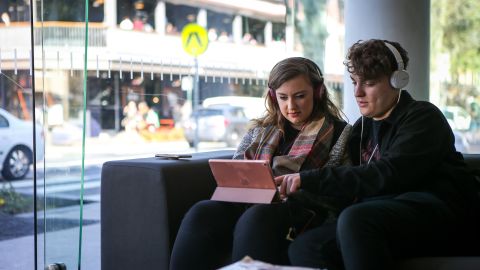Audiobooks are a booming industry. In recent years, they emerged as the fastest-growing format in publishing. Some welcome this digitisation as an inevitable shift in media consumption that better suits contemporary lifestyles. Others bemoan this as another step closer to the death of the novel.
So, let’s get straight to it: is listening to audiobooks the same as reading?
For University of Technology, Sydney academic and Sydney Morning Herald literary critic Dr Sunil Badami, the answer is no. “Not any more than being read to by your mum is reading,” he said. “While there is some neurological evidence that suggests no difference between the two, we should account for the focused attention each activity entails.
“Consider that most people will be doing something else – driving, housework, walking, whatever – while listening to an audiobook.”
Listening to a book will still get you right in to the story and transport you to another place.
For City of Sydney librarian Heather Davis, this double-tasking is a benefit.
“While not literally ‘reading’, I think that engaging with a narrative through any media can provide the same benefits as reading a book,” said Davis.
“Listening to a book will still get you right in to the story and transport you to another place.”
Clinical neuroscientist at the University of Melbourne, Dr Amit Lampit, agrees. “The ability to listen to a book while our hands and eyes need to be elsewhere allows us to engage with literature we may not have the time for otherwise. This is important because diversity is one of the key elements in maintaining a cognitively active lifestyle.”
Thinking about the brain’s cognitive process
Dr Lampit suggests that studies have shown that the dual tasking of listening and say, exercising, may be more beneficial to the brain than each activity alone. This may be because “exercising promotes the release of brain factors that fuel the growth of new brain cells and their connections. And this may boost the cognitive benefits of listening to audiobooks”.
Listening to audiobooks helps to train the brain circuits that handle auditory processing. Since most of the information we need to remember is provided in auditory form, this practice may help us in other everyday situations that involve listening, such as conversations and lectures.

On the other hand, we should consider what happens to the content we take in and the role of the audiobook reader in mediating this. “Reading is a creative endeavour where we encounter the text without mediation,” said Dr Badami.
“The difference in font or cover makes no difference. But the difference between Stephen Fry and Jim Dale reading is immense – consider accents, stresses, approaches and so on.”
Davis agrees. “If you get an audiobook reader with an annoying voice, it’s all over, no matter how good the story is.”
But she also adds that the point is to use your imagination – an action Davis considers equally active in both activities. “I get just as into the story when listening as I do when reading.”
Changing definitions
For better or worse, audiobooks are forcing us to question how we define reading and what makes a book.
“I know some writers are now writing for audiobooks – often using less formal language or less complicated words to make their work easier to read aloud,” said Dr Badami. “But it’s like writing a novel for the screen rights. It just makes for a terrible novel and a mediocre screenplay.”
I think it’s great that we are able to offer access to literature in ways that are able to match different learning styles.
However, as well as quality, we should consider what audiobooks mean for access. Listening to a book is useful for people with vision impairment, or those who have a physical, cognitive or learning disability, such as dyslexia.
“There are also lots of people out there for whom reading a novel just doesn’t match the way their brain processes information.
“Give them the same story in graphic novel form, or on audiobook, and they are able to make sense of it and be inspired to learn more.
“As a librarian, I think it’s great that we are able to offer access to literature in ways that are able to match different learning styles,” said Davis.
City of Sydney libraries hold more than 250,000 printed books, 2,800 audiobooks on CD, 2,400 eaudiobooks and 11,600 ebooks in their collection. Become a member and read or listen today.
Published 14 June 2018, updated 17 August 2018


